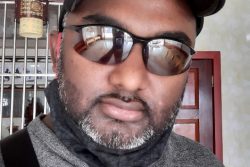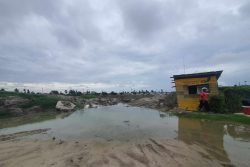President Irfaan Ali appeared before the UN General Assembly last week to condemn the threats from Venezuela about Guyana’s auction of offshore oil blocks. As well he might. According to the Venezuelan daily El Universal, Venezuelan Foreign Minister Yván Gil stated last Tuesday that the President of Guyana “intends to arrogate himself” a power he did not have by calling “an illegal bidding process for offshore oil and gas blocks in undelimited maritime territory.”
A statement from Caracas said, “The Government of Guyana does not have sovereign rights over these maritime areas and consequently any action within their limits is a violation of International Law, as long as they are not carried out through an agreement with Venezuela.” One might have thought that this was more than enough hogwash for one week, but no, other officials including President Nicolás Maduro himself had to weigh in with their own fanciful contributions.
Vice President Delcy Rodríguez on X (formerly Twitter) assured her readers that Venezuela would “assert its legitimate rights”, and from there went on to respond to statements of support for Guyana from OAS President Luis Almagro, an official Caracas regards in a hostile light. (Venezuela has not been a member of that body since 2019.) “This absurdity is always present when it comes to violating International Law, the sovereignty of States and their territorial integrity. Almagro joins the clique of Exxon Mobil employees to attack Venezuela,” El Universal quoted her as saying.
President Maduro homed in on what he called “the insolent meddling of the US,” and accused Washington of trying to manipulate and buy “through Exxon Mobil and the Southern Command, the servile politicians of Guyana who little by little have turned this nation into a colony.” It so happens that there are Guyanese citizens who might have a measure of sympathy with his description of the ‘servile politicians’ and ExxonMobil, but there is not one of them who subscribes to the view that Guyana does not have sovereign rights over Essequibo and its associated maritime areas.
Mr Maduro was responding to the US Undersecretary of State for Western Hemispheric Affairs Brian Nichols who was reported as saying on X that the United States recognised “Guyana’s sovereign right to develop its own natural resources”, and that Venezuela should respect “international law, including the 1899 arbitration award”. The President’s approach was echoed by the Venezuelan Foreign Ministry which was reported as accusing the State Department of trying to “ignore the legitimate rights of the Venezuelan people over their territory.”
It was what it was reported as saying next which must have left mouths in Georgetown and Washington agape. According to El Universal, Venezuela alerted the international community “of US intentions to create, in our Peace Zone of Latin America and the Caribbean, a military base in the Cooperative Republic of Guyana, to turn that country into the spearhead of an aggressive operation against the Bolivarian Republic of Venezuela, which would put the peace and stability of the entire region at risk.
“The People and the Government of Venezuela, united in defence of the Homeland, will not give in or be intimidated by pressure, blackmail, or threats.” This is to turn reality on its head, since over a period of sixty years, all the intimidation has been on the side of Venezuela.
This is not the first time that allegations of this nature have been made, and one might have thought that even Caracas would have recognised their ludicrousness but of course this is all about stirring up public sentiment among Venezuelans to create the impression they are in danger. Clearly Guyana cannot threaten militarily, but now with the nexus to ExxonMobil the citizens next door may be persuaded that the US can. This is to ignore the fact that Washington has been casting around for some time now to achieve political concessions from Mr Maduro which would allow for some level of accommodation.
But this was not all. There was a subsequent disturbing development. It began with the Venezuelan National Assembly approving a “Draft Agreement in repudiation of the insolent statements” of the US State Department, “in flagrant aggression against the sacred rights of Venezuela over its territory of Guayana Esequiba.” This was passed unanimously on Thursday. But it was what followed which should particularly attract Guyana’s attention, because President of the Assembly, Jorge Rodríguez, then proposed a motion for the holding of a “Consultative Referendum” so that Venezuelans could decide to reinforce their “inalienable rights” over Essequibo. The matter will go to the electoral authorities, which if they approve, would set a date for the referendum.
The purpose of this would seem to be firstly, the uniting of the country behind a common goal in circumstances where the Maduro government is more unpopular than ever, and where it seeks to resist pressures for a free and fair election in 2024. Secondly, it fears an ICJ decision which will go against it and the consequences of that at home, so it is taking measures in advance so it appears it did everything possible to avoid the outcome. What this signals to Guyana, if it did not know already, is that Venezuela will reject a result which recognises the validity of the 1899 Award. Thirdly, it is a means of advertising to the US et al, that the whole nation stands behind the government on this issue, no matter what the level of opposition to Maduro’s regime may be.
Stirring up a population on a territorial matter by means of a referendum is a potentially dangerous avenue to take, with quite unpredictable ramifications, and Guyana should be concerned. Caricom’s statement supporting this country on the territorial issue did make mention of the referendum, although the one from the Commonwealth confined itself to this country’s rights in relation to the oil blocks.
At the time President Ali appeared before the UN General Assembly on Wednesday, the matter of the referendum had not yet arisen, and he was therefore confined to the threats emanating from our neighbour to the west as a consequence of the oil block auction. Nevertheless, he said all the right things, calling on Venezuela to adhere to its obligations under the UN Charter and pointing out that the border controversy was currently before the International Court of Justice in The Hague. He described Venezuela’s position as a threat to regional as well as international peace and security in addition to constituting a threat to Guyana’s investment partners.
He was quoted as saying: “We demand that Venezuela honours its obligation under the Charter to pursue only peaceful means to settle any disputes it may have with Guyana, including adjudication before the International Court of Justice.” This court, he was reported as going on to say, should be given the opportunity to bring the controversy to an amicable resolution in accordance with international law, and in order to promote peace and equity. “Guyana will spare no effort in defending its sovereignty and territorial integrity”, he told the General Assembly in firm tones.
President Ali was also reported as expressing the view that international law was being undermined by threats and naked acts of aggression between sovereign states and the continuation of old conflicts and disputes between states. This was interesting considering the topic he next moved on to was the case of Ukraine. Here his stance was somewhat perplexing. While saying that the Russian invasion of Ukraine should end, his view was that greater diplomatic efforts must be made to achieve this. What he did not do was condemn Russia for its invasion, and this despite the fact that the case of Ukraine is an extreme version of the position Guyana finds itself in relation to Venezuela. He simply did not follow the logic of his own argument.
Russia too has told its people it was under threat from Ukraine and Nato, and that Ukraine is not an independent state but is part of Russia. Consistency therefore demands that this country denounce the invader. Why should anyone take us seriously when we cannot see the parallels between our own situation and that of others? Or that we apply the principles of international law and territorial integrity to ourselves but don’t come out in unambiguous support of those who are victims of even worse violations in this regard.
But it got worse. The President, while adding the caveat that Guyana supports the principle of sovereignty and territorial integrity and was in full solidarity with the people of Ukraine, nevertheless deplored the disparity in support given by the developed world to that country, compared to the Palestinian people and Haiti. Someone should explain to him that Ukraine is at war, and it is at war with a country which has huge stocks of sophisticated weaponry and one of the largest standing armies in the world. It cannot be defeated by Nato countries withholding expensive military supplies. It is not in an analogous situation to either the Palestinians or Haiti, the last named of which requires a great deal more than just money to return to some modest level of rational government. All of which is not to say that the developed world has not been miserly with its aid to many peoples and not just those the President mentioned; it is simply to observe that Ukraine falls in a special category.
Since one supposes that Presidents undertaking excursions into the wider world are advised by the Foreign Ministry, and may even have their speeches written for them by Takuba Lodge, clearly some of the officers there need to beef up on how our positions reflect adversely or otherwise on matters of our sovereignty. We have no need to make concessions to Russia, a close ally of Venezuela, or China, another ally of Venezuela who would not support us if the chips were down. And as for President Lula and his anomalous position on Ukraine, why do we have to follow him? The bottom line is that if Russia ever won the war in Ukraine, it would open the floodgates for all kinds of greedy nations, and Guyana, especially could not feel safe. What we need is a more sensibly oriented foreign policy.






